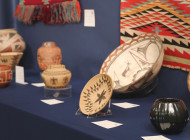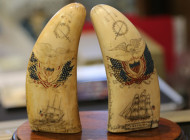
Representative Mitch Bolinsky said the bill he is co-sponsoring, Connecticut HB-5394 — An Act Concerning the Sale and Trade of Ivory and Rhinoceros Horn in the State, is commonsense legislation that protects endangered species at the same time it protects Connecticut’s antiques industry and heritage.
—W.A. Demers photo
By W.A. Demers
HARTFORD, CONN. – At a public hearing on February 15, antiques dealers, auctioneers, museum officials and others in the antiques trade urged the state environment committee to support HB-5394, An Act Concerning the Sale and Trade of Ivory and Rhinoceros Horn in the State, as it is written. “This bill, as written, is a win/win for saving endangered species and protecting antiques and historic objects,” said one auction house in an eblast sent out on February 14. “[Total ivory ban] proponents are currently putting forward amendments to a sensible bill. They are attempting to strip the bill of its antiques exemption and putting important artifacts and our cultural heritage at risk. These last-minute amendments will ban the sale of any antiques that contain any element of ivory or whalebone. Such items include many silver teapots, antique firearms, tea caddies and even a great deal of furniture from the Eighteenth and Nineteenth Centuries.”
Mitch Bolinsky, 106th Assembly District (Newtown, Conn.), is the bill’s co-sponsor and has actively supported the preservation of what he claims is an antiques industry that generates upwards of $2.5-billion in annual, taxable revenue, while at the same time supporting existing federal law that carves out exemptions for antiques. “This bill, as written,” he told the committee, “represents a voluntary, caring compromise offered by Connecticut’s antiques dealers; many leading cultural institutions, including the Wadsworth Athenaeum, the Connecticut Historical Society, Yale University Art Galleries and the Slater Museum of Norwich; as well as collectors and investors that own, trade and display ethically acquired, legally owned historical objects, works of art, musical instruments and antiquities.”
In written testimony for the committee, Vivian Zoe, director of the Slater Museum, pointed out that the sensible legislation, as currently written, would help protect future acquisitions to the museum’s collections. “With Connecticut’s distinguished history as an important maritime power, very particularly demonstrated in Norwich at the Slater Memorial Museum, beginning in the Eighteenth Century, historic artifacts and artworks made and used in our state and exemplified in the Slater’s collection include significant quantities that feature ivory as a decorative material,” she wrote. “Examples are as wide ranging as large pieces of furniture with ivory inlay and delicate miniature portraits painted in watercolor on thin disks of ivory. More importantly than those already in the collection, with regard to HB-5394, are those that might come on the market and be available for purchase to add to our collection.
“An example that is very current in our planning might be a Nineteenth Century sewing box, made in China specifically for the Western market. These were typically lacquered wood with shell marquetry exteriors. Inside, however, the best examples have an array of sewing implements like needle cases, thimbles and spools, all made from ivory and usually about 150 years ago.”
Lifelong Colchester, Conn., resident and third-generation owner of his family’s antiques business Arthur Liverant, said, “[As written], this bill will provide for both the protection of endangered elephants and rhinoceros, as well as the preservation of genuine antiques and historic objects. I strongly believe we all have the responsibility to protect the items of our shared past.”
Trade members say that the US Fish and Wildlife Service’s recent update of federal law reflects the need for a fair and balanced approach in ivory legislation. The proposed bill HB-5394 reflects this approach, they say, and will support the newly revised federal law, creating strict but fair legislation that includes a verifiable exemption for antiques and historic artifacts.
“The meeting went very well,” said Bolinsky. “We had extraordinary, strong testimony about our bill, centered on addressing the issue proactively. The committee appreciated that.” Bolinsky said that at the close of the session, both proponents of HB-5394 as written and animal rights activists agreed on pursuing a bill that protects both endangered species and the antiques trade. A follow-on meeting will be scheduled again at an unspecified date.




